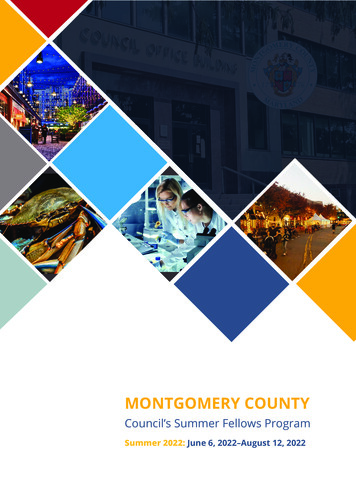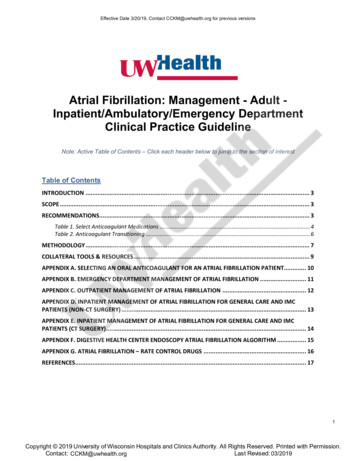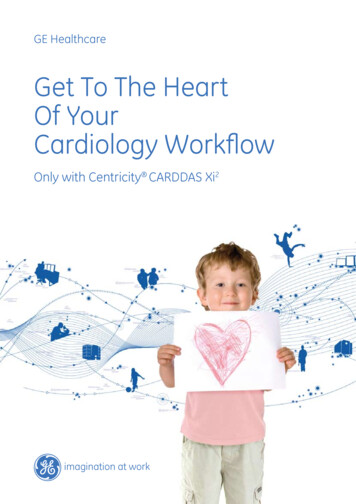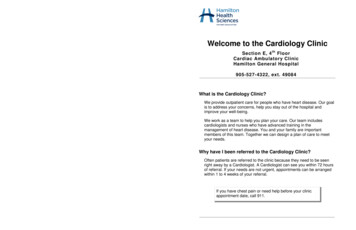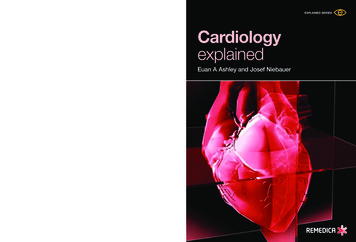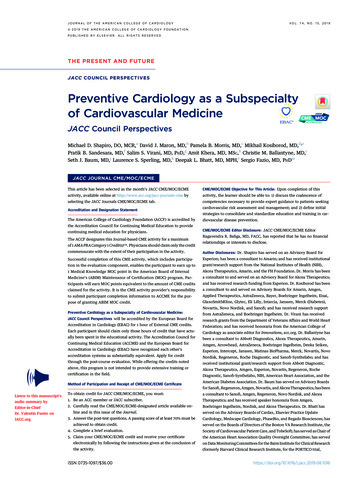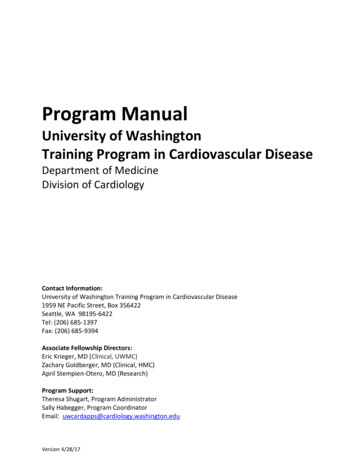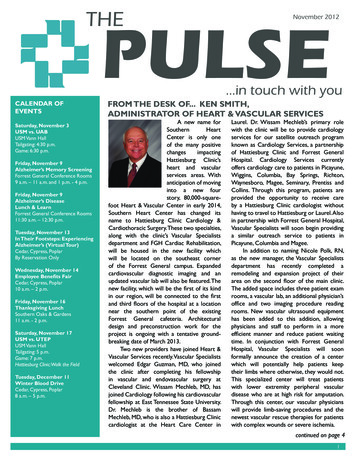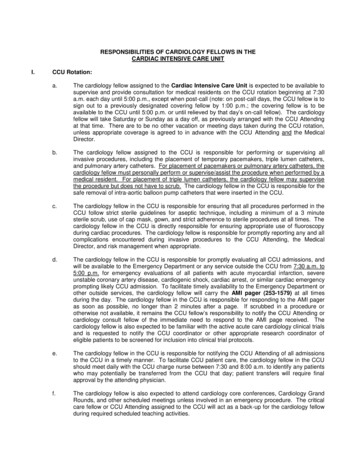
Transcription
RESPONSIBILITIES OF CARDIOLOGY FELLOWS IN THECARDIAC INTENSIVE CARE UNITI.CCU Rotation:a.The cardiology fellow assigned to the Cardiac Intensive Care Unit is expected to be available tosupervise and provide consultation for medical residents on the CCU rotation beginning at 7:30a.m. each day until 5:00 p.m., except when post-call (note: on post-call days, the CCU fellow is tosign out to a previously designated covering fellow by 1:00 p.m.; the covering fellow is to beavailable to the CCU until 5:00 p.m. or until relieved by that day’s on-call fellow). The cardiologyfellow will take Saturday or Sunday as a day off, as previously arranged with the CCU Attendingat that time. There are to be no other vacation or meeting days taken during the CCU rotation,unless appropriate coverage is agreed to in advance with the CCU Attending and the MedicalDirector.b.The cardiology fellow assigned to the CCU is responsible for performing or supervising allinvasive procedures, including the placement of temporary pacemakers, triple lumen catheters,and pulmonary artery catheters. For placement of pacemakers or pulmonary artery catheters, thecardiology fellow must personally perform or supervise/assist the procedure when performed by amedical resident. For placement of triple lumen catheters, the cardiology fellow may supervisethe procedure but does not have to scrub. The cardiology fellow in the CCU is responsible for thesafe removal of intra-aortic balloon pump catheters that were inserted in the CCU.c.The cardiology fellow in the CCU is responsible for ensuring that all procedures performed in theCCU follow strict sterile guidelines for aseptic technique, including a minimum of a 3 minutesterile scrub, use of cap mask, gown, and strict adherence to sterile procedures at all times. Thecardiology fellow in the CCU is directly responsible for ensuring appropriate use of fluoroscopyduring cardiac procedures. The cardiology fellow is responsible for promptly reporting any and allcomplications encountered during invasive procedures to the CCU Attending, the MedicalDirector, and risk management when appropriate.d.The cardiology fellow in the CCU is responsible for promptly evaluating all CCU admissions, andwill be available to the Emergency Department or any service outside the CCU from 7:30 a.m. to5:00 p.m. for emergency evaluations of all patients with acute myocardial infarction, severeunstable coronary artery disease, cardiogenic shock, cardiac arrest, or similar cardiac emergencyprompting likely CCU admission. To facilitate timely availability to the Emergency Department orother outside services, the cardiology fellow will carry the AMI pager (253-1579) at all timesduring the day. The cardiology fellow in the CCU is responsible for responding to the AMI pageras soon as possible, no longer than 2 minutes after a page. If scrubbed in a procedure orotherwise not available, it remains the CCU fellow’s responsibility to notify the CCU Attending orcardiology consult fellow of the immediate need to respond to the AMI page received. Thecardiology fellow is also expected to be familiar with the active acute care cardiology clinical trialsand is requested to notify the CCU coordinator or other appropriate research coordinator ofeligible patients to be screened for inclusion into clinical trial protocols.e.The cardiology fellow in the CCU is responsible for notifying the CCU Attending of all admissionsto the CCU in a timely manner. To facilitate CCU patient care, the cardiology fellow in the CCUshould meet daily with the CCU charge nurse between 7:30 and 8:00 a.m. to identify any patientswho may potentially be transferred from the CCU that day; patient transfers will require finalapproval by the attending physician.f.The cardiology fellow is also expected to attend cardiology core conferences, Cardiology GrandRounds, and other scheduled meetings unless involved in an emergency procedure. The criticalcare fellow or CCU Attending assigned to the CCU will act as a back-up for the cardiology fellowduring required scheduled teaching activities.
II.g.The cardiology fellow is expected to meet with the new interns and residents on the first day oftheir rotation in the CCU in order to review CCU organization, logistics, and curriculum. Given thecritical role in supervising CCU house staff, the CCU fellow is also expected to report anyperformance issues encountered with CCU interns and residents promptly to the CCU Attendingand/or Medical Director.h.The cardiology fellow in the CCU is responsible for providing a limited series of didacticpresentations to the CCU house staff on core critical care cardiology topics that have beenpreviously prepared and archived. The fellow should organize the timing of these presentations(generally 1 or 2 per week, timed after completion of morning rounds) over the course of therotation.i.During the CCU rotation, the cardiology fellow will have no other clinical or researchresponsibilities unless approved by the CCU Medical Director.j.In circumstances where the cardiology fellow is unable to meet all of his or her directresponsibilities, the CCU Attending and the CCU Medical Director should be immediately notified.It remains the responsibility of the cardiology fellow in the CCU to arrange appropriate back-upcoverage.On Call Responsibilities for the CCU:a.The cardiology fellow on call will provide primary coverage for the CCU from 5:00 p.m. to 7:30a.m. the following day. This coverage will include timely evaluation of all the patients with acutemyocardial infarction unstable coronary syndromes, or cardiac emergencies who present to theemergency room, and of all admissions to the CCU. The fellow will be notified immediately by theCCU triage nurse via page of any new admission(s) to the CCU. The fellow is responsible forpromptly and directly evaluating any new patient admitted to the CCU or any significant problemdeveloping in a CCU patient, in person. The fellow will also be responsible for promptlycommunicating any findings or problems regarding CCU patients to the CCU Attending and to thepatient’s primary attending when appropriate.b.To facilitate availability to the Emergency Department, the cardiology fellow on call will carry theAMI pager (253-1579). The cardiology fellow on call should ensure primary availability foremergency evaluations in the Emergency Department or CCU at all times. The cardiology fellowon call is responsible for responding to the AMI pager as soon as possible, and no longer than 2minutes after a page. The current protocol regarding the recommended management for patientspresenting to Barnes-Jewish Hospital with ST-elevation acute myocardial infarction is included insection III below. For the management of any patient with acute myocardial infarction who is acandidate for reperfusion therapy when the decision for reperfusion has not already beendetermined by the ED Attending (typically in conjunction with the on call Interventional CardiologyAttending), the cardiology fellow on call will immediately communicate with the on callInterventional Attending such that a recommendation regarding acute reperfusion therapy may beprovided without delay. Following determination of reperfusion strategy, the CCU Attendingshould also be notified. The fellow is then to be physically present in a timely manner to assist indirecting the further evaluation and management of such patients, including assisting inpreparation for emergency catheterization and primary PCI or in managing the immediate perithrombolysis time period.c.The CCU Attending should be notified before any procedures are performed on any CCUadmissions.d.Duty hours: In accordance with the rules of the ACGME, Cardiology fellows should work no morethan 80 hours a week. The fellows should have an average of one day off a week (4 days off in a28-day period). Furthermore, the fellow should not be on call more often than one day in three
(average call is much closer to one day in ten). On post-call days, the CCU fellow is to sign out toa previously designated covering fellow for CCU responsibilities from 1:00 to 5:00 p.m.III.PROCESS OF CARE FOR THE EARLY MANAGEMENT OF PATIENTS PRESENTING TO THEBARNES-JEWISH HOSPITAL EMERGENCY DEPARTMENT (ED) WITH ACUTE ST-SEGMENTELEVATION MYOCARDIAL INFARCTION (STEMI).a.b.c.d.Following recognition of STEMI on the ECG, the ED Attending is to perform an expedited historyand physical exam. The AMI management form is readily available in the ED to the Attendingphysician to facilitate specifically obtaining critical information regarding the patient’s indicationsand contraindications for thrombolysis or cardiac catheterization, and to thereby facilitate thedecision for and guide the optimal mode of immediate reperfusion therapy.For patients with STEMI without contraindications for cardiac catheterization or percutaneouscoronary intervention (PCI) who present to the hospital during the active hours of operation forthe cardiac catheterization laboratory (Cardiac Procedure Center, or CPC), typically between thehours of 8:00 am and 6:00 pm on weekdays, primary PCI is recommended as the preferred modeof emergency reperfusion therapy. The ECG is faxed immediately by the ED to the CPC and theED Attending physician should call the CPC (2-9300) to assess availability and to speak directlyto an Interventional Cardiology Attending to refer the patient for emergency primary PCI (goal 60 minutes from door to reperfusion by first balloon inflation, and 90 minutes from first medicalcontact). It is expected that the data regarding that patient’s potential contraindications forcardiac catheterization will have been completely acquired by the ED Attending prior todiscussion with the Interventional Cardiologist. The ED should simultaneously activate the AMIpager system (253-1579), and the CCU fellow should respond immediately to assist in preparingthe patient for emergency cath and primary PCI if not previously accomplished by the FOD.For patients with STEMI who are appropriate candidates without contraindications who presenteither after hours or when the CPC is not available, a decision to administer thrombolytictherapy (goal 30 minutes from hospital arrival) may be recommended at the discretion of theED Attending physician, usually in telephone consultation with the Interventional Cardiologist oncall. The AMI pager system (253-1579) should also be simultaneously activated, but thedecision for immediate reperfusion by thrombolysis can be made without awaiting Cardiologyresponse.For patients with STEMI arriving after hours for whom primary PCI would be a preferable mode ofemergency reperfusion (e.g., most patients), using the Doctors’ Access Line (DAL) the EDAttending should activate the CPC on call team and AMI pager and simultaneously directly pagethe Interventional Cardiology Attending on call to discuss the case (goal remains 90 minutes toreperfusion by first balloon inflation). It is again expected that the data regarding that patient’spotential contraindications for cardiac catheterization will have been completely acquired by theED Attending prior to discussion with the Interventional Cardiologist. The on-call fellow is to bephysically present in a timely manner to obtain informed consent for emergency cardiac cath andpossible PCI, to accompany the patient to the CPC, and to assist in directing further evaluationand management.This process has been recommended in order to further expedite the process of care for STEMI atBarnes-Jewish Hospital, and has been approved by Interventional Cardiology, the Division of Cardiology,and the Division of Emergency Medicine. The AMI pager system will remain active and serve to involveCardiology to assist in the early management of the patient with STEMI – to that end, the cardiologyfellow carrying the AMI pager will continue to respond as rapidly as possible to facilitate the care of thepatient. As always, data regarding the impact of these changes on performance measures will berigorously collected and analyzed by the AMI Performance Improvement Committee.
IV.Educational Goals and Competencies of the CCU Rotation:Patient Care: Expertise in management decisions regarding patients with suspected acute coronary syndromes(ACS). The fellow should be able to diagnose acute myocardial infarction, recognize indicationsand contraindications to particular therapies, and effectively triage the appropriate patient to acutereperfusion when indicated by thrombolytic therapy and/or acute primary percutaneousintervention. Expertise in proper use of medical therapy indicated for ACS, including thrombolytic agents,antiplatelet agents (e.g., ADP platelet receptor antagonists, glycoprotein IIb/IIIa inhibitors), antithrombotics (e.g., unfractionated and low molecular weight heparins, direct thrombin inhibitors,factor Xa antagonists), and combination regimens. Familiarity with the attendant risks andpotential adverse reactions associated with these therapies. Expertise in the evaluation and management of post-MI complications (post-MI angina, mitralregurgitation, VSD, rupture). Expertise in the evaluation and management of arrhythmias, including post-MI arrhythmias.Recognition of the indications and contraindications for, and the technique of, electricalcardioversion. Expertise in recognizing appropriate indications for use of right heart and pulmonary arteryhemodynamic monitoring and temporary transvenous pacemaker use. Competence in the safeplacement of Swan-Ganz catheters, temporary pacemakers, and central venous lines, even in thesetting of complex cardiovascular disease. Expertise in the interpretation of Swan-Ganz catheterhemodynamic waveforms and differentiation of the causes of shock or pulmonary congestion byanalysis of the hemodynamic values and waveforms. Expertise in recognizing and managing cardiogenic shock, acutely decompensated congestiveheart failure, accelerated hypertension, resuscitated sudden cardiac death, and pericardialtamponade. This includes recognizing indications and contraindications for, and acquiringcompetence in the performance of emergency procedures such as pericardiocentesis and intraaortic balloon pump catheter insertion, and assessing potential need for advanced mechanicalventricular support. Expertise in the appropriate selection and application of a wide range of cardiovascularmedications in the setting of critical care cardiology, including inotropic agents, vasopressors,vasodilators, beta blockers, nitrates, ACE inhibitors, calcium channel blockers, statins and antiarrhythmic drugs. Expertise in determining appropriate risk stratification strategies for patients with ACS.Recognition of the indications for emergency and elective right and/or left heart catheterization asapplicable to the varied patient populations with ACS, heart failure, and valvular heart disease inthe CCU. Understanding of the appropriate selection application of non-invasive testing asapplied to these acute care cardiac patients, including echocardiography, stress testing, andnuclear imaging techniques.Medical Knowledge: Demonstrate an appropriate knowledge of the pathophysiology of acute coronary syndromesincluding ST elevation MI. Understand evidence-based practices for the use of thrombolytic therapy and IIb/IIIa inhibitors. Understand evidence-based practices of the use of ACE inhibitors, ß-blockers, and statins inacute coronary syndromes. References: (Please note: all of the following are available at www.acc.org)O'Gara PT, Kushner FG, Ascheim DD, et al. 2013 ACCF/AHA Guideline for the Management ofST-Elevation Myocardial Infarction: A Report of the American College of CardiologyFoundation/American Heart Association Task Force on Practice Guidelines. J Am CollCardiol. 2013;61(4):e78-e140. doi:10.1016/j.jacc.2012.11.019.
Amsterdam EA, Wenger NK, Brindis RG, et al. 2014 AHA/ACC Guideline for the Management ofPatients With Non–ST-Elevation Acute Coronary Syndromes: A Report of the AmericanCollege of Cardiology/American Heart Association Task Force on Practice Guidelines. J Am CollCardiol. 2014;64(24):e139-e228. doi:10.1016/j.jacc.2014.09.017.Thygesen K, Alpert JS, Jaffe AS, et al. Third Universal Definition of Myocardial Infarction. JAm Coll Cardiol. 2012;60(16):1581-1598. doi:10.1016/j.jacc.2012.08.001.Rihal CS, Naidu SS, Givertz MM, et al. 2015 SCAI/ACC/HFSA/STS Clinical Expert ConsensusStatement on the Use of Percutaneous Mechanical Circulatory Support Devices inCardiovascular Care: Endorsed by the American Heart Association, the Cardiological Societyof India, and Sociedad Latino Americana de Cardiologia Intervencion; Affirmation of Value by theCanadian Association of Interventional Cardiology-Association Canadienne de Cardiologied’intervention . J Am Coll Cardiol.2015;65(19):e7-e26. doi:10.1016/j.jacc.2015.03.036.Yancy CW, Jessup M, Bozkurt B, et al. 2013 ACCF/AHA Guideline for the Management ofHeart Failure: A Report of the American College of Cardiology Foundation/American HeartAssociation Task Force on Practice Guidelines.J Am Coll Cardiol. 19.Nishimura RA, Otto CM, Bonow RO, et al. 2014 AHA/ACC Guideline for the Management ofPatients With Valvular Heart Disease: A Report of the American College of Cardiology/AmericanHeart Association Task Force on Practice Guidelines. J Am Coll Cardiol. 6.Zipes DP, Camm A, Borggrefe M, et al. ACC/AHA/ESC 2006 Guidelines for Management ofPatients With Ventricular Arrhythmias and the Prevention of Sudden Cardiac Death: AReport of the American College of Cardiology/American Heart Association Task Force and theEuropean Society of Cardiology Committee for Practice Guidelines (Writing Committee toDevelop Guidelines for Management of Patients With Ventricular Arrhythmias and the PreventionofSuddenCardiacDeath). jacc.2006.07.010.January CT, Wann L, Alpert JS, et al. 2014 AHA/ACC/HRS Guideline for the Management ofPatients With Atrial Fibrillation: A Report of the American College of Cardiology/American HeartAssociation Task Force on Practice Guidelines and the Heart Rhythm Society. J Am CollCardiol. 2014;64(21):e1-e76. doi:10.1016/j.jacc.2014.03.022.Strickberger S, Benson D, Biaggioni I, et al. AHA/ACCF Scientific Statement on the Evaluation ofSyncope: From the American Heart Association Councils on Clinical Cardiology, CardiovascularNursing, Cardiovascular Disease in the Young, and Stroke, and the Quality of Care andOutcomes Research Interdisciplinary Working Group; and the American College of CardiologyFoundation In Collaboration With the Heart Rhythm Society.J Am Coll Cardiol. 2006;47(2):473484. doi:10.1016/j.jacc.2005.12.019.Practice-based Learning and Improvement: All fellows should understand the limitations of their knowledge and judgment – they mustunderstand when help is needed. Accept feedback and learn from their errors. The fellows will demonstrate self-motivation to access information technology germane to thecases in the CCU. The fellows are expected to participate in quality improvement initiatives relative to acute MI.Interpersonal and Communication Skills: The fellows will demonstrate caring and respectful behavior with patients and families.
The fellows will conduct respectful discussions of advance directives and code status.The fellows will facilitate the learning of residents and health care professionals.Professionalism: Demonstrate respect, compassion and integrity. Demonstrate a commitment to excellence and ongoing professional development. Demonstrate a commitment to ethical principles pertaining to confidentiality of patient information,informed consent, and other aspects of patient care. Develop an appreciation for the ethical, cultural, and socioeconomic dimensions of illness. Fellows should display initiative and leadership.System-based Practices: Work effectively with nurses, secretaries, social workers, and other members of the healthcareteam. Advocate for quality patient care in a complex system of residents, interns, attendings, andconsultants.Teaching Methods: The fellows will participate and help direct the bedside work/teaching rounds which start daily at7:30 to 8:30 am. The fellows will help the interns and residents gather the data necessary to discuss thepathophysiology of illness and therapeutic plan of each patient. The fellows will review all necessary ECGs, echocardiograms, x-rays, and cardiaccatheterizations with the residents and attendings.Method of Evaluation: Fellow performance: The attendings will discuss the expectation with the fellow at the beginningof each 2 week block. At the end of each 2-week block, the attending will give verbal feedback tothe fellow. At the end of the rotation, one attending, after consultation with the other attendings,will complete the evaluation on MyEvaluations.com. In addition, we will utilize a 360º review bythe nursing staff to help assess professionalism and communication skills.
cardiology fellow in the CCU is directly responsible for ensuring appropriate use of fluoroscopy during cardiac procedures. The cardiology fellow is responsible for promptly reporting any and all complications encountered during invasive procedures to the CCU Attending, the Medical Director, and risk management when appropriate. d.
